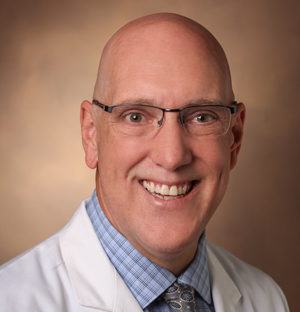Mark Kelley retires, having ‘profoundly shaped surgical oncology’ at VUMC

Mark Kelley, MD, MMHC, medical director of the Williamson County General Surgery Division in the Department of Surgery at Vanderbilt University Medical Center, has retired, effective Oct. 1, after 28 years of exceptional service and leadership.
“Dr. Kelley transformed the Division of Surgical Oncology and Endocrine Surgery into one of the nation’s largest and most productive academic surgical oncology programs,” said Carmen Solórzano, MD, John L. Sawyers Chair in Surgical Sciences and chair of the Department of Surgery. “His remarkable contributions span clinical excellence, innovative research and impactful education.”
Kelley, an associate professor of Surgery in the Division of Surgical Oncology and Endocrine Surgery, is lauded by his colleagues and surgical leaders for his contributions both at VUMC and nationally.
“Dr. Kelley’s career reflects an unwavering commitment to excellence in clinical care, research, education and leadership,” said Seth Karp, MD, H. William Scott Jr. Chair in Surgery and chair of the Section of Surgical Sciences. “His legacy has profoundly shaped surgical oncology at Vanderbilt and beyond. We are grateful for his dedication and leadership.”
In 1997, Kelley joined the VUMC faculty as an assistant professor in the newly established Division of Surgical Oncology and Endocrine Surgery and served as clinical director of the Vanderbilt Breast Center until 2005. His leadership skills led to his appointment as chief of the Division of Surgical Oncology and Endocrine Surgery in 2002, a role he held until 2015.
“As clinical director of the Vanderbilt Breast Center, he led its development and transition from a small practice in the Village at Vanderbilt to a comprehensive breast center at One Hundred Oaks,” said Solórzano. “In 2005, he passed the clinical directorship to Dr. Ingrid Meszoely, whom he recruited back to Vanderbilt after her surgical oncology fellowship. Today, the Vanderbilt Breast Center is one of the largest and most comprehensive programs in the United States.”
Recognizing the importance of focused training in breast surgical oncology, Kelley developed the framework for a breast surgical oncology fellowship. Expansion of the curriculum under the leadership of Mary Hooks, MD, MBA, and Ingrid Meszoely, MD, led to accreditation of the program by the Society of Surgical Oncology in 2016.
Under Kelley’s leadership, the Division of Surgical Oncology and Endocrine Surgery expanded from four surgeons to a multidisciplinary team of more than 20 surgeons, advanced practice providers (APPs) and research scientists. He also played a pivotal role in recruiting and mentoring key faculty who now serve as VUMC surgical and Vanderbilt-Ingram Cancer Center leaders, including Rondi Kauffmann, MD, MPH; Christina Bailey, MD, MSCI; Kamran Idrees, MD, MSCI, MMHC; Meszoely, Solórzano and others.
Kelley was a sought-after mentor throughout his career, and assisted numerous medical students, surgical trainees and junior faculty as they participated in projects and developed their own research. Under his leadership, the Division of Surgical Oncology and Endocrine Surgery was highly ranked, year after year, as a favorite learning environment for general surgery trainees. More than 30 residents completed surgical oncology fellowships during Kelley’s tenure, and many are leaders in the field today, including five current VUMC faculty members.
He was an early advocate for the integration of APPs into clinical roles. In 1999, he established training and mentorship programs for APPs specializing in breast health and surgical oncology, and these programs served as models for integrating APPs into surgical practices throughout VUMC. Today, there are 10 APPs practicing in inpatient and outpatient roles in the Division of Surgical Oncology and Endocrine Surgery.
Kelley was a surgical innovator and the first surgeon in Tennessee to perform sentinel lymph node biopsy for breast cancer and melanoma in 1997. This procedure has transformed the care of these cancers. Kelley developed an Institutional Review Board (IRB)-approved protocol to train surgeons on this technique, leading to the rapid and safe application of the new surgical procedure at VUMC and in the community.
Kelly was also integrally involved in the development of multidisciplinary clinical and research programs at Vanderbilt-Ingram Cancer Center. From 2000-2012, he served as chair of the VUMC Cancer Committee. This group monitors and reports cancer volumes and outcomes, guides quality improvement, and ensures compliance with national cancer treatment standards. During his tenure as chair, VICC was continuously accredited by the American College of Surgeons Commission on Cancer. The program was also routinely recognized as one of the top National Cancer Institute-accredited comprehensive cancer centers nationwide during that time.
Early in his career, Kelley had an independent laboratory that focused on translational research in melanoma tumor biology and contributed to the early development of immunotherapy for melanoma. He established the melanoma and cutaneous malignancy tissue repository in 2003. This IRB-approved research repository has collected tumor tissue samples from patients undergoing surgical resection or biopsy with paired clinical data from more than two decades. This invaluable resource has supported high impact basic and translational studies that have led to novel combinations of immunotherapy and targeted therapy being investigated in clinical trials today.
“Dr. Kelley is highly committed to the advancement of cancer care through research, and we are grateful that he will remain active in clinical and translational research with VUMC and VICC as professor of Surgery, retired, to continue to improve care for patients with cancer,” said Karp.
The post Mark Kelley retires, having ‘profoundly shaped surgical oncology’ at VUMC appeared first on VUMC News.


